|
|
|
Sort Order |
|
|
|
Items / Page
|
|
|
|
|
|
|
| Srl | Item |
| 1 |
ID:
190755


|
|
|
|
|
| Summary/Abstract |
Why do individuals engage in violence against the state? This research investigates the biological and environmental determinants of individual-level participation in political violence through the use of a Candidate Gene Association, gene-environment interaction, study. Existing research has demonstrated that variation in a specific gene (called MAO-A) is associated with aggression. However, relatively little scholarly attention has been paid to the interaction with the environment; specifically, the ways in which repressive political environments differentially incite acts of violence. Using original genetic, survey and experimental data collected on participants and non-participants of political violence, I find that under conditions of political repression, individuals with the low MAO-A genetic variant are significantly more likely to engage in acts of political violence. By examining both the genetic and environmental factors influencing political violence, the results make a significant contribution to our understanding of how genetic variation may lead to violence.
|
|
|
|
|
|
|
|
|
|
|
|
|
|
|
|
| 2 |
ID:
190758
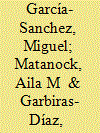

|
|
|
|
|
| Summary/Abstract |
To what extent are legislators, responsible for the implementation of many peace agreements, responsive to citizens’ preferences? Examining the 2016 Colombian peace agreement, we embed an experiment in the 2019 wave of a survey of all the members of Congress. We inform legislators about the attitudes of the general population and residents of conflict-affected regions on a provision included in the peace agreement: the creation of 16 special seats in the House of Representatives reserved for conflict areas. We find that legislators underestimate citizen support for this policy, and the magnitude of their misconception is correlated with the positions of their parties on the issue. Moreover, we find that providing information about citizens’ support for the policy does not affect legislator support for the provision.
|
|
|
|
|
|
|
|
|
|
|
|
|
|
|
|
| 3 |
ID:
190759
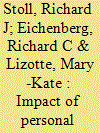

|
|
|
|
|
| Summary/Abstract |
Since 1995, presidents from both parties have increased US government initiatives in pursuit of global gender equality, but there has been little scholarly work that explores public support for these initiatives. We analyze the level of citizen support for several types of global gender equality programs. In addition, we explore support for one specific rationale for the policy –the argument that the participation of women in decision-making will make the world a more peaceful place. Our central hypothesis is that personal security dispositions are an important correlate of support for global gender initiatives, and our analysis yields support for the hypothesis. Citizens who place a high value on personal security display stronger support for gender equality in foreign policy. We close with suggestions for further research and discuss the policy implications of our findings, in particular with respect to public opinion on the use of military force.
|
|
|
|
|
|
|
|
|
|
|
|
|
|
|
|
| 4 |
ID:
190763
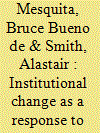

|
|
|
|
|
| Summary/Abstract |
Leaders shift political institutions to ameliorate threats to their tenure. The masses might rebel to replace the leader and change institutions. Disloyalty by political insiders might result in a coup. Leaders liberalize when the masses present a greater threat and ‘autocratize’ to dissipate threats from elites. A two-step procedure tests these arguments: (1) The risks of revolution and coup are estimated as a function of leader health, experience, economic conditions and extant institutions. (2) These risks are used to predict institutional change in a heteroskedastic regression model. The magnitude and direction of institutional change depends upon whether the masses or elites pose the greater threat. When both risks are high, leaders must gamble as to which risk they believe is greatest. In such circumstances, institutions are highly volatile even as the aggregate direction of change becomes unclear.
|
|
|
|
|
|
|
|
|
|
|
|
|
|
|
|
| 5 |
ID:
190761
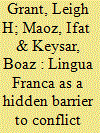

|
|
|
|
|
| Summary/Abstract |
Longstanding intergroup conflict is one of the most perilous issues on the global stage, leading to violence, displacement, and loss of life. Finding strategies to bring parties to the negotiation table is therefore of utmost importance for conflict resolution. Here we address a common problem in intergroup conflict - the lack of a shared, native tongue - which is typically solved by using a lingua franca. Three experimental studies revealed that a peace-building proposal presented in a lingua franca is perceived as less favorable to one’s own side than a proposal presented in one’s native tongue. Specifically, our studies demonstrated that the use of a lingua franca elicits higher levels of hatred and lower levels of sympathy, thereby reducing the perceived favorability of the proposal. Broadly, these findings indicate that the seemingly innocuous choice of the language could have serious implications for conflict resolution as well as for international diplomacy.
|
|
|
|
|
|
|
|
|
|
|
|
|
|
|
|
| 6 |
ID:
190754


|
|
|
|
|
| Summary/Abstract |
Can an individual impact a phenomenon as overwhelming and complex as war? Do leaders impact interstate war dynamics? Leaders high in grandiose narcissism focus their efforts on maintaining their inflated self-image during war by striving desperately for victory. While most leaders sacrifice their historical image for state interests, more narcissistic leaders only exit wars if they “win”, or overcome threats to their self-image. Narcissists essentially ignore revealed information and create deadlock to avoid looking like losers. In other words, narcissistic leaders encourage us to look beyond traditional rationalist models of wartime dynamics. This paper analyzes United States’ interstate war duration from 1897 to 2007 and finds support for the argument that more narcissistic United States presidents extend war duration. This paper also compares Eisenhower’s handling of the Korean War and Nixon’s handling of the Vietnam War as an illustrative probe of causal mechanisms.
|
|
|
|
|
|
|
|
|
|
|
|
|
|
|
|
| 7 |
ID:
190756


|
|
|
|
|
| Summary/Abstract |
Foreign electoral interventions have attracted greater attention since the Russian intervention in the 2016 U.S. elections. Even though the United States has a long history of intervening in other countries’ elections, evidence about what drives public support for U.S. foreign electoral intervention is scarce. This paper uses a new set of surveys and experiments to test hypotheses about what drives the American public’s views of U.S. electoral interventions abroad. We find that there is no taboo against such U.S. interference in the American public. However, public support for U.S. election interference is not automatic. Respondents do not support interventions solely to advance U.S. interests or to protect democracy, although they prove more supportive of interventions on behalf of democratic parties that also favor U.S. interests or to protect longstanding democracies. Finally, support for an intervention rises when it is framed as responding to the actions of a great-power rival such as Russia.
|
|
|
|
|
|
|
|
|
|
|
|
|
|
|
|
| 8 |
ID:
190757
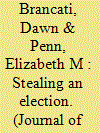

|
|
|
|
|
| Summary/Abstract |
Political actors often resort to electoral violence to gain an edge over their competitors even though violence is harder to hide than fraud and more likely to delegitimize elections as a result. Existing explanations tend to analyze violence in terms of the same factors as fraud, or to treat violence as a means of last resorts given its overtness. We introduce a novel explanation that does neither, arguing that political actors often use violence for the very reason that it is hard to hide. Its overtness, we argue, allows political actors to observe whether the agents they enlist to manipulate elections for them do so and reduces these agents’ likelihood of shirking in turn. We develop our argument through a formal model showing that electoral monitors, by exacerbating problems of moral hazard (shirking), can induce actors to increasingly turn to violence and use process tracing to examine the implications of this model through the example of Egypt.
|
|
|
|
|
|
|
|
|
|
|
|
|
|
|
|
| 9 |
ID:
190760
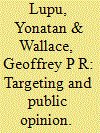

|
|
|
|
|
| Summary/Abstract |
How does targeting in armed conflict affect public opinion in conflict zones? Armed actors choose between targeting militaries and civilians, further choosing whether to target civilians discriminately or indiscriminately. Existing work suggests these choices have important implications for conflict dynamics, in part by influencing public opinion, yet the causal effects of these choices on individual attitudes have not been clearly established. We conduct a survey experiment in the Donbas region of Ukraine, an area that has witnessed years of protracted fighting. We find that reports of civilian targeting robustly reduce approval of both the government and separatist forces. However, we find that the effects of discriminate civilian targeting are not statistically distinguishable from those of indiscriminate civilian targeting. Finally, we find that our respondents generally preferred a restrained, rather than reciprocal, response from actors in this armed conflict. We explain the implications of our findings for theories of wartime violence.
|
|
|
|
|
|
|
|
|
|
|
|
|
|
|
|
| 10 |
ID:
190762


|
|
|
|
|
| Summary/Abstract |
Research on the efficacy of leadership decapitation has focused primarily on targeting the topmost leaders of groups. Yet, most organizations rely on multiple leaders with specific functional or geographical responsibilities, rather than a single symbolic leader. In this context, we pose the following question: how are the effects of leadership decapitation on a group’s short-term operational capacity conditioned by the type or rank of targeted leaders? We argue that due to the risks faced by militant organizations, upper-tier leaders will delegate operational duties to lower-tier leadership for security purposes. Because of the shift of the principal-agent dynamic to lower-tier leaders, targeting of lower ranked leaders versus topmost leaders is more likely to result in a loss of control over foot soldiers, and trigger negative effects such as a rise in indiscriminate violence. We conduct our study using the case of Islamic State Khorasan in Afghanistan, with weekly data on the group’s attacks, and multi-tier leadership losses between 2015–2019 across 72 districts.
|
|
|
|
|
|
|
|
|
|
|
|
|
|
|
|
|
|
|
|
|